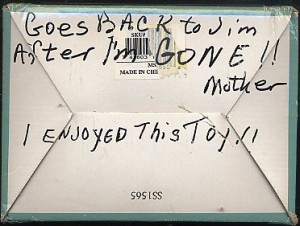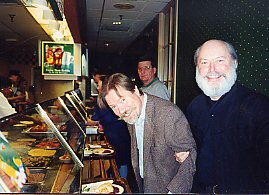Listen to Jim: http://jimreedbooks.com/mp3/santarocking.mp3
or read on…
I run a Christmas shop, a Christmas museum, a Christmas antique emporium.
Why Christmas?
Well, you’d know the answer to that—if you’d known my Mother.
To Mother, every day was Christmas Eve and Christmas Day combined. All her life, she was able to see through the pain and confusion of life, through to the sweetness that she felt from the time she was born till her own Mother died fifteen years later. She never left childhood alone on the back step, but took it with her and carried her understanding of children and their pure and innocent outlook on life, all the way to another existence, 83 years after her birth.
Every day was Christmas at our house. Each day, we paid careful attention to weeds and frogs and paint chips and stuffed toys and sunbeams and tears and relatives and concrete sidewalks and Pepsi Colas and fresh cornbread. Under Mother’s tutelage, we kids learned to note things, notice things, note people, notice people.
Taking her example, we learned to find something fine in just about everything, everybody, every Thing, every Body. Each day, we woke up to a Christmas gift of life, neatly wrapped, anxiously waiting to be unwrapped.
That being said, maybe the rest of this story will make more sense to you.
Whenever I use the gift of noticing people, I learn something new.
While she was still alive and active, Mother spent some time each day hiding messages she prepared for her kids, grandkids, great-grandkids, and her extended family of kids. She didn’t give us these messages directly, since her experience with human nature warned her that we would probably ignore them because of our youth and immaturity.
So, Mother sent messages in bottles for us to find accidentally through the years, each time just as we were almost grown-up enough to recognize and appreciate them.
Christmas was Mother’s favorite season, so she made sure that more secret messages were generated at that time. She wanted us to remember how much fun, how much love, swirled about our family so that we would remember to pass this joy along to our own families and extended families.
Mother died in 1997, and life went on without her, as life does. We kids and grandkids and great-grandkids went our way and did our own lives the way we thought we had designed them. At times, we acted as if we had never had a mother, as if we had invented ourselves, as if we were self-made.
But we could never fool ourselves for long.
Without Mother’s nurturing and sacrifices, without her humor and overwhelming bluntness, we could not have been formed.
One day, my sister Barbara gave me a bunch of stuff she had salvaged from Mother’s old house in Tuscaloosa. In the pile was an unopened box that felt hefty enough not to be empty. When I had time a few days later, I took that box up and peered at it, reading the words thereon:
“MUSICAL ROCKING SANTA. Sure to delight collectors of all ages, this 8 inch high rocking Santa captures the spirit of Christmas past with exquisite handfinished detail.”
The box was colorful and depicted a kindly snoozing Santa.
The imprinting continued, “It features a genuine Sankyo wind-up musical movement from Japan. Handcrafted and handpainted in China by people who care. This copyrighted design is made under an exclusive licensing agreement with the copyright holder. (C) 1995 II INC.”

This box looked familiar to me, but I couldn’t quite get it. If it was manufactured in 1995, it couldn’t have been one of my childhood toys.
Hmm…
I carefully opened the box, making sure not to damage anything, since I might find that it belonged to somebody else in the family.
Inside, a toy any Christmas Lover would covet:
A statue of Santa Claus—a dozing Santa Claus. I can still see the toy on my shelf at home, today: Santa’s dozing, full-capped and furred, in a green highbacked rocking chair with a yellow kitten peeping over his right shoulder, a flop-eared dog in his lap, a December 26 calendar in his drooped left hand and a small toy at his feet. His bathrobe and striped longjohns and tasselled red boots top it all off.
This man is tired and at peace, falling asleep so fast he’s forgotten to remove his spectacles.
When I wind him up, the chair gently rocks back and forth, a melody tinkles its way about the room, “We Wish You a Merry Christmas…”
I loved this toy, and it took me a few days to figure out its history. Recalling that Mother never stored anything she owned without leaving a note about it, I went back to the box, turned it upside down and, sure enough, there was Mother’s message to me, these few years later. I could hear her musical voice saying it aloud,
“This goes back to Jim after I’m gone! I enjoyed this toy! –Mother”

That was my Mother, ok. She never threw anything away, knowing that someone in the far future would find joy in each remaining object, if only it was stored safely enough to be found.
This was her way of giving back to me the joy I had given her when I presented her with the Santa before she died.
Now, ol’ Santa sits on my shelf, waiting to entertain, waiting to make me remember my Christmas Mother, waiting for me to pass him along to the next person who would take a close look at the bottom of the box to see what kind of message I would add to Mother’s
(c) 2020 A.D. by Jim Reed
jim@jimreedbooks.com
http://www.jimreedbooks.com
Twitter and Facebook



